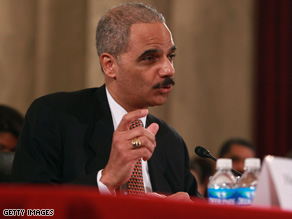Jolene Ivey in the San Francisco Examiner
Md. mulls denying licenses to illegal immigrants
By KATHLEEN MILLER
Mar 19, 2009
Associated Press Writer | 3/19/09 3:40 PM
In an online Spanish language chat room, people from all over the East Coast seek tips on how to get driver's licenses in Maryland even though they don't live there.
Businesses run classified ads in Spanish-language publications in Washington, D.C., Virginia and Maryland urging "undocumented Hispanic friends" to take advantage of the opportunity to get Maryland ID without having to prove they're in the country legally.
In one case, Maryland motor vehicle officials say, 68 different people applying for licenses and IDs gave the same address for an 800-square-foot home in Baltimore.
Maryland is one of just four states _ and the only one east of the Mississippi _ where people don't have to prove they're legal U.S. residents to get driver's licenses. Some lawmakers are pushing to change that this year, arguing that Maryland's rules make it a target for fraud by undocumented people from all over the U.S.
But advocates here and in other states with similar rules _ Hawaii, New Mexico and Washington _ argue that allowing illegal immigrants to get state-issued identification gives police broader databases to use when investigating crimes and increases the rate of auto insurance coverage.
"It makes the streets safer for all of us," said Delegate Jolene Ivey, a Democrat from Prince George's County who supports continued access to Maryland licenses for undocumented residents.
The problem, say officials with Maryland's Motor Vehicle Administration, is that they've been overwhelmed with requests for identification appointments as other states have tightened requirements.
A Department of Legislative Services analysis assumed the state issued about 6,700 licenses and ID cards to illegal immigrants in 2008, but cautioned exact statistics are tough to nail down. Between July 2007 and June 2008, the MVA issued roughly 508,000 new licenses and 170,000 ID cards.
State Motor Vehicle Administration Chief John Kuo says the demand has outpaced the state's foreign-born population growth. A toll-free number to book license appointments for non-citizens received 1 million attempted calls from all over the country in its first day of operation last year. The state, which only has 5.6 million residents, now limits hot line access to people calling from Maryland.
"Because of Maryland's status nationally, the number of fraud attempts at Maryland MVA remains a serious challenge," state transportation officials said in written testimony in favor of changing the policy, noting fraud cases shot up 478 percent between 2003 and 2007.
Maryland Delegate Ron George, R-Anne Arundel, says the license policy is cheapening the value of a state ID for other residents. Some states, such as Arizona, Colorado and Oklahoma, now require extra proof of identification before they'll license people relocating from states that issue ID to illegal immigrants.
"It's not good," said George, who has twice tried and failed to get the legislature to require state officials to ensure license applicants are in the U.S. legally. "Our residents deserve licenses that are on an even playing field with other states."
George is trying again this year, this time with support from Democratic Gov. Martin O'Malley and other Democrats.
Advocates for maintaining the current policy, such as Delegate Ana Sol Gutierrez and the immigrant advocacy group CASA of Maryland, have attempted to fight fraud on their own. In interviews with Spanish-language publications earlier this year, Gutierrez warned that some ID fraud is a felony.
More important, she told the paper El Comercio, fraud "closes doors for those who actually live in Maryland."
Kim Propeack, a spokeswoman for CASA, says her organization's research found that one of the cheaper firms charges a $150 fee to robocall license hot lines just to get license appointments.
State officials "know there are private companies that are selling appointments, selling in-state addresses, and they have done nothing to combat those companies," Propeack said.
She said scammers even loiter at Motor Vehicle Administration offices, offering to sell Maryland addresses to people from other states.
Propeack said CASA has asked state officials to reach out to foreign-language media and to change its documents to inform people there is no reason to hire anyone to get a license. The group also discourages undocumented immigrants from other states from trying to get Maryland IDs.
"This is a right that has been fought for and obtained by people living in Maryland," Propeack said. "When people call us from other states and ask for information about Maryland licenses, we tell them to go lobby for the right in their home state."
___
Read House Bill 387: http://mlis.state.md.us/2009rs/fnotes/bil_0007/hb0387.pdf
___
On the Net:
Maryland Motor Vehicle Administration: http://mva.state.md.us



